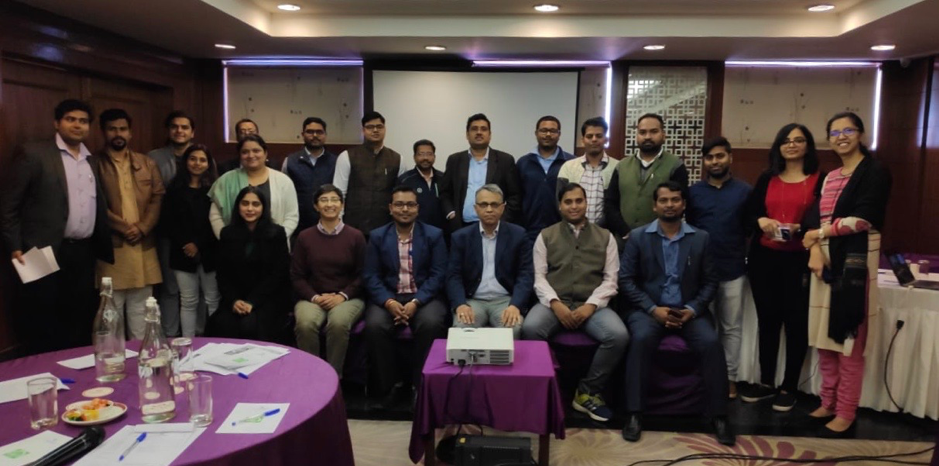Sectoral experts, Government and Non-government bodies convene to find energy solutions for climate vulnerable areas in Jharkhand
On 18th December, 2019, WRI India organized a workshop titled 'Improving development outcomes in climate vulnerable areas of Jharkhand through improved energy access'. The objective of this convening was to hear from experts in Jharkhand on the climate challenges faced by the state and the energy solutions that need to be developed, keeping this context in mind. Mr.Arvind Kumar, Project Director of Jharkhand Renewable Energy Development Agency (JREDA) gave the keynote address, and shared information regarding energy interventions by JREDA. In particular, he discussed the work underway in the health and education sectors. Community Health Centres (CHC) and Kasturba Gandhi Balika Vidyalayas (KGBVY) were provided with 10kW and 20kW systems respectively to replace diesel generators and improve power quality to ensure service continuity, comfort and safety. This helped to initiate a discussion with government departments like National Health Mission (NHM) and Transformation of Aspirational Districts Programme (TADP) and non-government organisations like PanIIT Alumni Reach For India Foundation (PARFI) and Emmanuel Hospital Association (EHA) on ideas for integrating efforts to solarise health centres and training centres going forward.
 Participants at the Jharkhand workshop, with WRI India's Energy Access for Development team. Participants include experts from Central University of Jharkhand, Centre for Environment and Energy Development (CEED), CLEAN, EHA, FFF, Gram Oorja, IMD, ISEP, JREDA, MLINDA, NHM, PARFI, Syngenta Foundation, TADP, Transforming Rural India Foundation (TRIF), and UNDP.
Participants at the Jharkhand workshop, with WRI India's Energy Access for Development team. Participants include experts from Central University of Jharkhand, Centre for Environment and Energy Development (CEED), CLEAN, EHA, FFF, Gram Oorja, IMD, ISEP, JREDA, MLINDA, NHM, PARFI, Syngenta Foundation, TADP, Transforming Rural India Foundation (TRIF), and UNDP.
WRI India’s team introduced the audience to the Energy Access work in India and shared climate related information on the state of Jharkhand. Jharkhand is already facing the impacts of climate change and as per NASA Earth Exchange Global Daily Downscaled Projections (NEX-GDDP) models, Jharkhand will see an average 1-1.2 degrees Celsius temperature increase and extension of summer by 20-35 days by mid-century. While average annual rainfall increases by 50-100 mm in the state, it will be accompanied by extreme precipitation and long dry spells. Overall, the intensity and frequency of extreme events have gone up; the state has been suffering from extreme heat stress, increased storm events and resulting lightning strikes. Dr.Samdarshi from the Central University of Jharkhand shared his comments on the challenges around water shortage in the context of renewable energy solutions like water pumps, while engaging in a discussion on the changing context of the state over the last few decades.
Mr.Abhishek Anand, Senior Scientist from the Indian Meteorological Department (IMD), provided insights on more recent events like hailstorms and fog. Such changes in climatic conditions and extreme climatic events have an impact on the existing electricity infrastructure. It also requires energy enterprises to design climate resilient energy solutions that enable improvement of healthcare and education services and enhance livelihood opportunities. To understand the state of affairs, Mlinda and Gram Oorja went into technical details on how to design and monitor the performance of solutions operating in lightning prone areas to ensure minimal damages.
However, to develop such solutions, implementation and monitoring support is required in addition to policies. This is especially relevant in the context of vulnerable areas where socioeconomic vulnerabilities have to be considered along with climate events. As expressed by UNDP experts, there is convergence at the state capital where multiple departments are working together to develop the State Action Plan for Climate Change (SAPCC) and State Vision Plan. However, challenges persist at the local level where these plans are implemented. Further information collected on-ground does not always find place in the plans being created at the top, as shared by CEED. Better data flow is needed on renewable energy programs between departments and for the continuous monitoring of existing systems' performance. Integration between the sectors is key to providing services, as shared by TRIF.
Along with technology solutions and policy implementation, finance is an essential component for unlocking some of the stated solutions. The financing solution differs based on the type of intervention. For instance, Gram Oorja and Mlinda have a community-based model where users pay for the electricity consumed while maintaining their livelihood activities and a corpus fund is maintained for O&M. In other sectors like health and education, government support and grants continue to be the main source of financing. To catalyse these investments, Syngenta Foundation stressed on the need for CSR funds. Given that the state of Jharkhand has received less than 2% of the total CSR spending in the country over the last financial year, this is a gap that needs to be addressed.
Keeping in mind the existing expertise and the informed discussions, participants agreed to develop best practices to support development organisations, think tanks and government bodies for implementing climate resilient energy solutions in rural areas. The discussions would be taken to the district level for ensuring the inclusion of local organizations and communities in developing plans and implementing them for maximum impact.